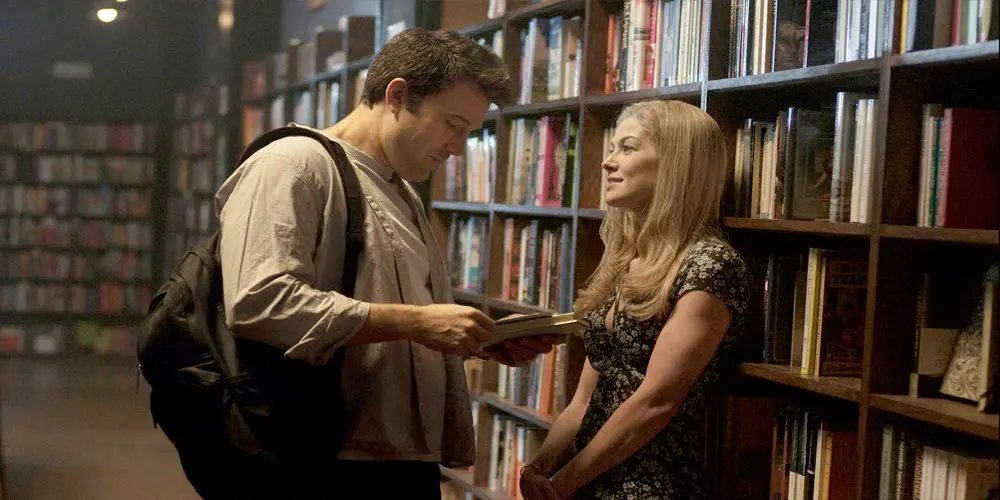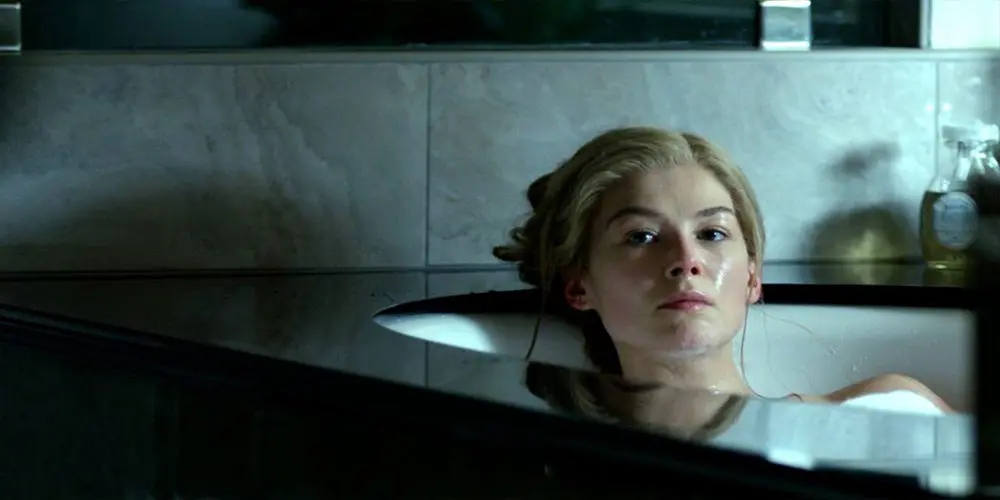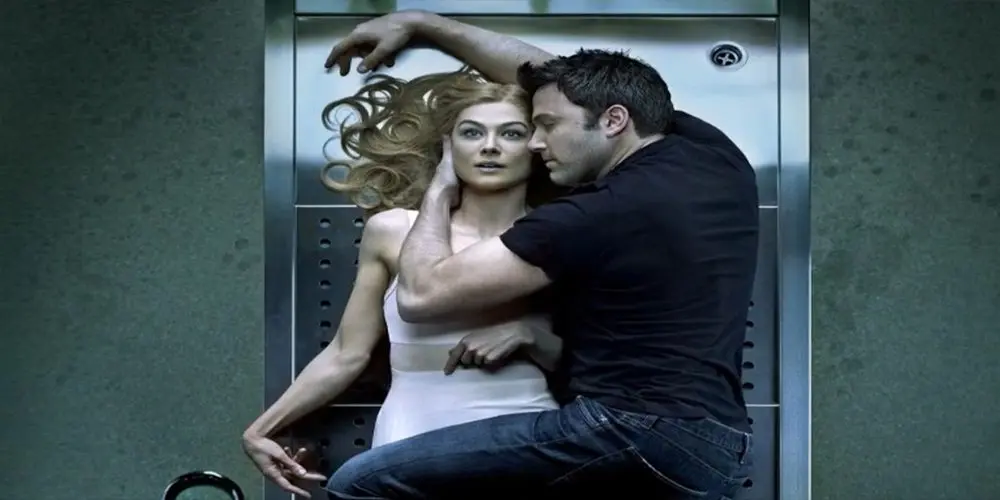As a story, Gone Girl is utterly preposterous. It’s the kind of writhing narrative built almost entirely upon big plot swerves; one heavily reliant on characters never, ever doing anything they should or would in the given situation, and ultimately only able to stand up to even a single, cursory viewing by simple virtue of being so ludicrous that merely attempting to unravel the knotty threads of logic seems like a complete waste of time.
As a film though, Gone Girl is pretty fucking spectacular.
Gone Girl Review and Plot Summary
Seriously, this is good. So good, in fact, that it somehow manages to drag even Tyler Perry up to its level as a slick, media-savvy defence attorney who’s genuinely awesome all the way through. Not to mention teasing a career-redefining performance out of Rosamund Pike as Ben Affleck’s missing, possibly murdered wife.
She’s the titular gone girl, Amy, who disappears from her superficially perfect marriage and upper-middle-class home leaving behind nothing but a series of clues which steadily implicate her husband, Nick, as her kidnapper and possible killer.
Nick, meanwhile, is thrust into the middle of an increasingly suspicious media circus and police investigation as he attempts to juggle his grief over Amy’s disappearance with the very real prospect of being given the death penalty for it, guilty or otherwise.

Ben Affleck (L) and Rosamund Pike (R) in Gone Girl (Credit to 20th Century Fox)
From there things get increasingly complex and, frankly, quite bizarre. But I can’t really talk about any of that just yet because Gone Girl is one of those movies which are heavily predicated on a big mid-point plot twist which totally upends everything you thought you knew about the characters and story until that moment.
Whether or not you actually buy into the central idea – and believe me, it requires a hell of a suspension of disbelief – is none of my business, but it wouldn’t be fair of me to just openly discuss it without prior warning. So, if you haven’t seen Gone Girl and feel that you probably would like to at some point down the line, stop reading right now.
As for everyone else… here’s the skinny. See, Amy isn’t dead, nor is she even “missing” in the traditional sense of the term. She’s on the run after going to painstaking, absurdly-detailed lengths to stage her own death and frame Nick for the murder.
Even her personal journal – excerpts of which function as narration and trigger the occasional flashback sequence – turns out to be a meticulous forgery designed to characterize Nick as a cold, calculating abuser rather than just the hapless dork he actually is.
About halfway through the movie, after spending our entire time following Nick around as he attempts to micro-manage his media persona, defend his innocence and investigate the clues surrounding Amy’s disappearance, we’re suddenly thrust into the viewpoint of Amy herself as the she reveals, attempts to justify and follows through on the various stages of her plan.
So Amy is a psychopath, sure, but she’s also that rare kind of emotionally-frozen, hyper-intelligent maniac who commits horrible, manipulative acts just because rather than as a result of long-term emotional trauma.
She’s a stone-cold killer possessed of an incredibly astute survival instinct who is just insane enough to absolutely believe everything she’s doing is totally justified, yet also just relatable enough that in the landscape of facile, upscale middle-American life she isn’t as much of an aberration as one might think.
That’s another thing about Gone Girl: everyone and everything is a target of some scathing deconstruction, from the characters themselves to the sacred institutions of marriage and family to the sensationalist media, legal system and law enforcement.
Amy is only really the “bad guy” in the sense that she’s seen to commit the most reprehensible acts for the least justifiable reasons; pretty much the entire cast is in some way corrupt, unfaithful, self-serving or morally vacant, and a lot of the film’s fun is to be found in unravelling not its own narrative but the broader narrative of our daily lives through an almost behind-the-scenes look at these ubiquitous cultural fixtures.

Rosamund Pike in Gone Girl (Credit to 20th Century Fox)
David Fincher has made a career out of adapting airport potboilers and otherwise straightforward stories into exceptionally well-made thrillers; ones which use the nuts and bolts of their basic narratives to explore the wider ramifications of their story and what it means for the world it exists inside of.
Gone Girl does that so well it almost doesn’t matter that it is so inherently farfetched, or that the seams of its internal logic are visible from the midpoint all the way through to the end.
The characters are so earnest in their own absurdities and the screenplay so resolute in its dismantling of societal expectations that the various plans we either see Amy execute or learn she has already carried out cease to be the actual point of what we’re watching.
What was the whole point of Gone Girl?
From the ground up, Gone Girl is built on artificiality. Amy’s disappearance only receives widespread media attention because her parents are famous authors, and their claim to fame is a series of children’s books based on their daughter’s life in which Amazing Amy achieved all the things that Real Amy was unable to.
Many of Amy’s soliloquys revolve around the burden (particularly among women) of having to deviate from your true self in order to construct a more socially palatable persona; the compulsion to secure even an average, decent-looking guy like Nick (who turns out to be kind of an unfaithful jerk anyway) just because the suburban nuclear family is what society expects you to covet. It’s biting and effective because people really do live in this kind of mutual misery just to save public face.
I’m not saying I agree with Amy specifically or Gone Girl as a whole, I just think there are interesting conversations to be had about why we choose to live the way we do, and the purpose of art in all its forms is to encourage us to ask those questions about ourselves and the world around us.
If nothing else, Gone Girl is a film that reinforces a point I was making to my girlfriend recently about monogamy being a biological misstep, although admittedly I was trying to make a threesome happen.
More Articles on Gone Girl




